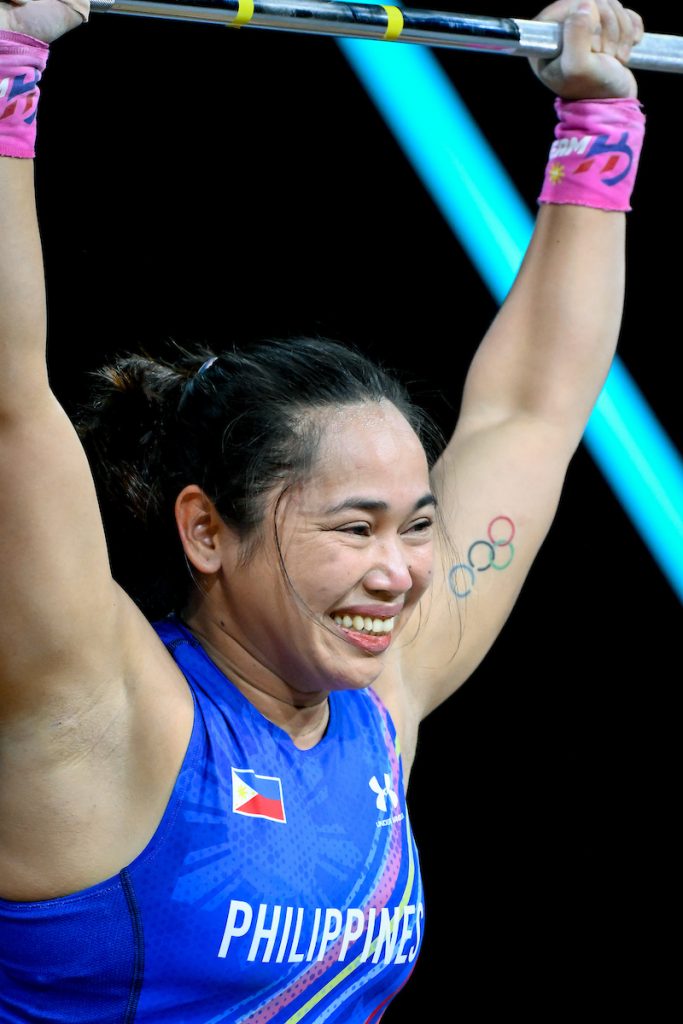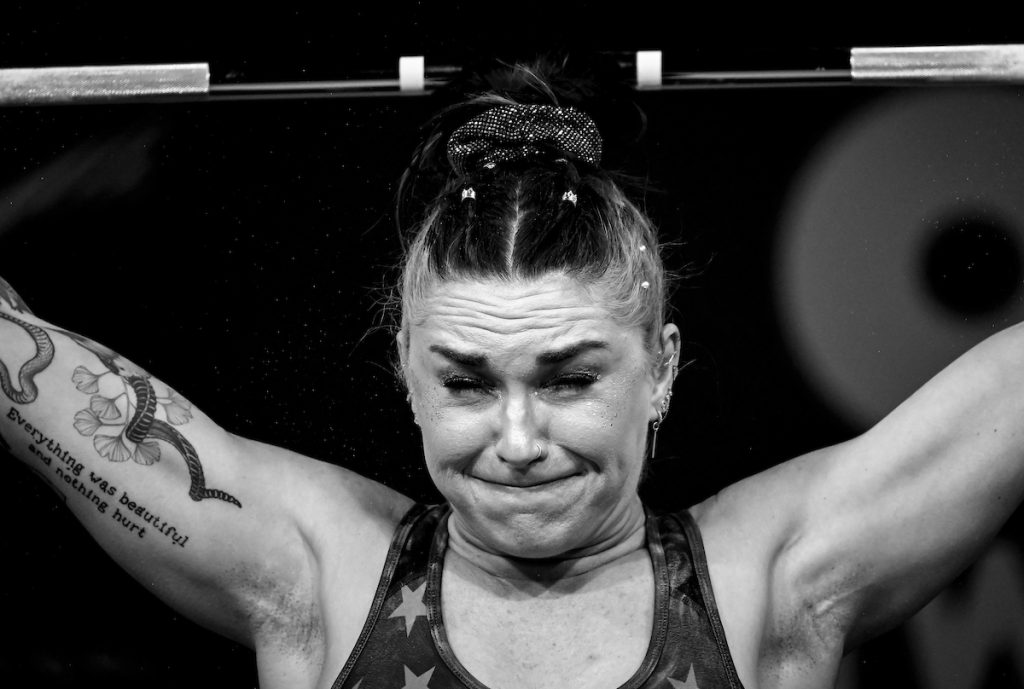2024-2032 IWF Strategic Plan, Pillar 1: Safeguarding the IWF stars
When elaborating the 2024-2032 IWF Strategic Plan, and specifically looking into the main pillars sustaining the International Federation’s “building” for the years to come, the first evident conclusion was that “Athletes” should obviously be part of those structural foundations. The constitution of the Working Group itself left no doubts on the importance IWF stars should have in the future of weightlifting. Out of the nine members of that committee, two are members of the IWF Athletes Commission, its Chair Forrester Osei, and also Hidilyn Diaz, the first-ever Olympic champion (in any sport) from the Philippines.
The tone was therefore set and it is clearly stated in the first-ever IWF Strategic Plan, unanimously approved this week in Riyadh by both the Executive Board and the Congress: “Athletes should always be at the core of the IWF activities. In addition to their role in the governing structure and their importance in decision-making procedures, athletes are the stars of the IWF events: therefore, optimal conditions must be created for them. From the strict anti-doping policy to the improvement of the Development Programme on a global scale, the IWF must ensure its lifters feel safe and secure, can compete in clean and fair events, continue to be a valuable asset in the Olympic programme, and play an active role in the promotion of the sport they love”.

Hidilyn Diaz (PHI) was part of the IWF Strategic Plan working group
After validating this first fundamental pillar – the IWF roadmap is the result of an extensive consultative process, by which the stakeholders of the IWF Family periodically gave their feedback on the several chapters from the Strategic Plan – it was necessary to provide some “substance” to this IWF priority. Sub-pillars were then proposed and accepted, all aiming at providing those “optimal conditions” specified above.
The implementation of a robust, transparent, and reliable anti-doping strategy is naturally the main tool to ensure the fairness of the IWF events and ensure our athletes can compete in a clean environment. Since 2019, the IWF anti-doping activities have been performed by the International Testing Agency – this is a guarantee that the programme runs efficiently and independently. This effort and its positive results were highlighted this Tuesday by Ben Cohen, ITA’s Director General, during the IWF Congress in Saudi Arabia.
This important topic may be fairly considered as part of a larger context related to the safeguarding of the IWF athletes. Also inside this enormous field, we can include the reinforcement of educational programmes, the implementation and further improvement of a gender identity policy (already in place), the creation of mechanisms to prevent harassment in sports, the development of an Athlete Transition programme (aimed at supporting lifters at the end of their competitive career), or the instauration of a prize money strategy at the IWF’s major events.
The inclusive approach of these initiatives somehow materialised with the creation in 2023 of the first-ever IWF Refugee Team. Two of them took part in the World Championships in Riyadh: Aline de Souza and Monique Araujo. The latter was particularly happy today, after establishing and winning with a new personal best of 231kg the group B of the women’s 87kg. “The Refugee Team is the perfect example of what the IWF can do for the athletes who have gone through very difficult circumstances and are looking for an opportunity to compete. For me, it’s quite extraordinary to be here and live these moments. I had seven years to compete at the highest level and I managed to improve my best performance. It’s just unbelievable,” declared a very emotional Araujo at the end of her effort in Riyadh.

Monique Araujo (WRT)
Speaking more generally, the refugee athlete – she is originally from Brazil, but presently living in the USA – has no doubts: “The IWF is clearly in the good direction concerning the importance it gives to its athletes around the world. This and other projects will definitively improve our condition and importance within not only weightlifting but in the sports community in general”. Recalling some dramatic experiences from other lifters around the world, Araujo concludes: “You are literally saving lives with programmes like this one. A huge thanks to the IWF. I am now a new person!”
Without getting to such extreme situations, the IWF already appointed a Safety and Integrity Officer and will establish, as part of the Plan, tools aimed at preventing injuries and mental health problems. Specific programmes for the lifters’ entourage are also in the pipeline.
Moreover, the harmonious progress of weightlifting in the five continents cannot be dissociated from an additional effort from the IWF in its Development Programme. It is one of the “measurable” actions in the Strategic Plan: ideally, until 2028, our International Federation should invest 25% more funds than the ones allocated at present, and a further 15% should be achieved by 2032. The ambitious project concerning the IWF Academy project on a continental basis is also part of this “package”.
Finally, athletes’ interests are also promoted when they have enhanced opportunities to show their value. The Olympic arena is the pinnacle of each lifter’s life. The IWF Strategic Plan is very clear: innovation and improved athlete quota are two goals for the years to come. On the number of competitors at the Games, there is also a precise target: 160 lifters across eight men’s and women’s events at the 2032 Olympic rendezvous – this represents a one-third rise on Paris 2024 numbers, with the positive consequence of also increasing the competition days and broadcast exposure.
Another way to maximise the IWF stars’ influence is to establish Ambassador Programmes, directly involving the lifters in the promotion of the sport they cherish, using all possible digital platforms and channels at our disposal.

Mattie Rogers (USA)
After finishing fourth in the women’s 81kg, Mattie Rogers (USA) agreed to share her reflections on three key points specified in the Strategic Plan: prize money, improvement of the Olympic quota, and ambassador programmes.
On the first one, she admits: “That would be so cool! I would love to see that implemented, as it would help a lot of the lifters. In most countries, this is a ‘broke’ sport, so the introduction of prize money would for sure help. That would be amazing”. Asked if a good starting point could be the award of World Record, Rogers smiles: “I will not get any of those, but it would be very good for the others achieving them!”
On the Olympic quota, the US star is also quite enthusiastic: “It’s very positive as it would allow a bit more ‘space’ in each country for more athletes to take part in the Olympics. It doesn’t mean it becomes easier, it just means we could have more lifters going to the Games”.
With a lot of followers on her social media platforms, Rogers is also keen on developing an ambassador programme: “It is a very important project – if we have athletes acting as ambassadors we can reach a wider audience and a different one that maybe the IWF alone cannot get. Only athletes know what they go through, so sharing those experiences is quite meaningful, especially for the younger athletes”.
She concludes: “There is definitively an effort from the IWF to enhance the promotion and representation of the athletes and to improve things all around. This is all we ask for”.
In the next weeks, every Friday, we will come back to each of the four pillars of the 2024-2032 IWF Strategic Plan. After this first one, we will successively analyse Pillar 2 (Enhancing the IWF events), Pillar 3 (Keeping the IWF safe), and Pillar 4 (Reaching beyond the IWF).
By IWF Communications
Photos by Giorgio Scala/Deepbluemedia










